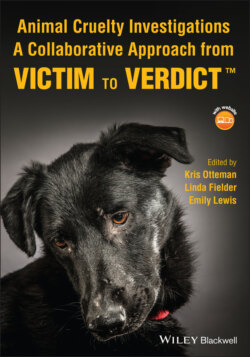Читать книгу Animal Cruelty Investigations - Группа авторов - Страница 116
2.5.5 Small Mammals (Rabbits, Guinea Pigs, Mice, Rats, Ferrets)
ОглавлениеInappropriate husbandry and diet are common causes of disease in small mammals. Rabbits and guinea pigs are herbivores and require a high‐fiber diet, while rats and mice are omnivores. Ferrets, weasels, and mink are omnivores and require meat protein as well. Their nutritional requirements in captivity are best met by commercial diets developed for their species, supplemented with appropriate fresh foods. Guinea pigs require vitamin C in their diet as they are unable to produce this in their body like other mammals. Small mammals require constant access to potable water. Small mammals are intelligent and social animals. Providing appropriate housing will ensure they are able to display their normal behaviors. These species benefit from living in pairs or groups, but they can cause severe injuries and even death if fighting occurs. Adequately sized enclosures allow for the animals to eat, sleep, and exercise and allow them to be free from their waste. Some rodents require substrate or bedding for burrowing and sleeping. Enclosures should be free from hazards and cages with wire floors should be kept in good repair so as not to injure the animal's feet or entrap them. Cages with wire bottoms should always include a solid bed or resting platform where the animal can relieve itself from the constant pressure of standing on wire, which coupled with contact with feces and urine, leads to painful ulcerations and infection of the feet and hocks. Rabbit enclosures ideally have a thick and soft flooring, and wire or mesh flooring throughout the enclosure should be avoided. Rabbits do not have footpads, but have coarse fur covering the toes and paws. Rabbits kept in wire housing without access to soft, solid flooring commonly develop a condition called pododermatitis, which is an infection of the paw, and can be a serious and life‐threatening condition. Most small mammals do not do well in extreme heat or cold and some, like rabbits, are prone to heat stroke and must have access to a shaded area if housed outdoors. Overcrowding is stressful to small mammals and can cause them to fight with and cannibalize their cage mates and offspring. Dental health is very important in small mammals and is a common cause of medical concern in these species. All teeth in rabbits and guinea pigs are continuously growing, throughout the life of the animal, and they require oral examination at veterinary visits. Rabbits may suffer from malocclusion, a condition in which their teeth are misaligned causing them to become overgrown and curled, which can prohibit them from chewing their food. This condition is sometimes visible, but the teeth may grow backward into the cheek and so a visual inspection of the mouth is advised when malocclusion is suspected. Some species of rabbit (Figure 2.4) and guinea pig have long hair coats that require consistent grooming. Severe matting can lead to pain and skin infections.
Figure 2.3 Tight collars may become embedded in an animal's skin causing painful wounds and infection.
Source: Oregon Humane Society.
Figure 2.4 Angora rabbits require regular grooming to prevent matting of their long coats.
Source: Oregon Humane Society.
